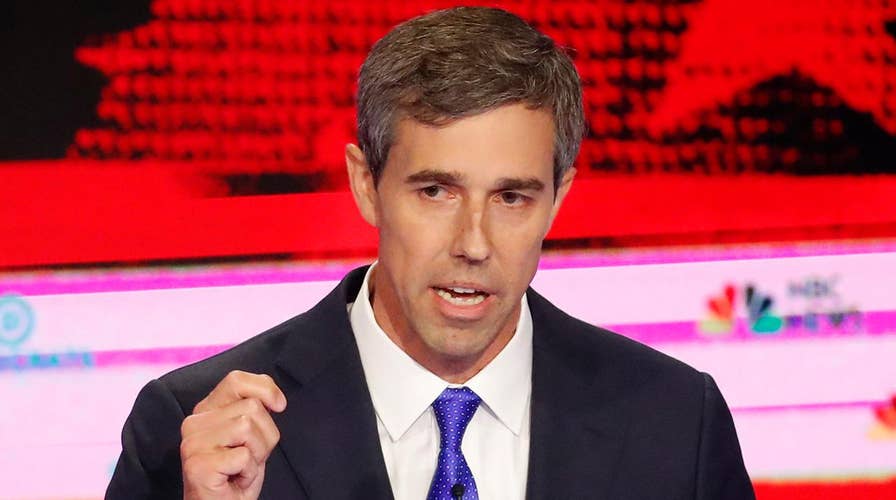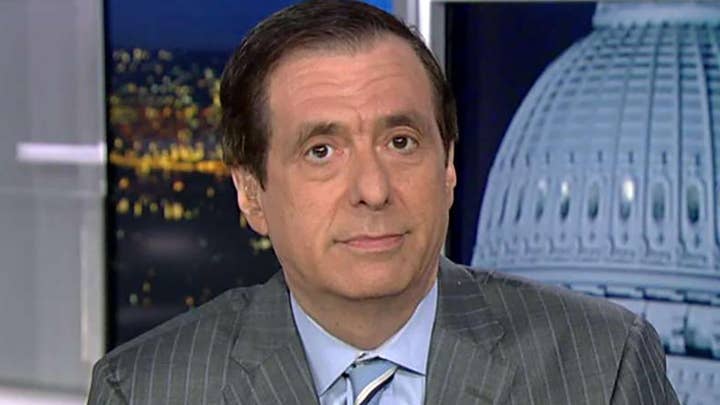Beto O'Rourke on defense at first 2020 Democrat primary debate
The former Texas congressman is challenged the most by other White House hopefuls on the debate stage; Peter Doocy has recap from Miami, Florida.
With the first half of the Democratic debates in the rearview mirror, let's take a quick look back at some of the early winners and losers:
Winners
Elizabeth Warren
By comfortably merging her grievance politics with left-wing policy prescriptions, the Massachusetts senator did what she needed to do.
She also got a boost from NBC with speaking slots to open and close the night.
Surprisingly, Warren took zero incoming from any of her competitors. She entered Wednesday as the unquestioned leader of the 10 participants on the JV stage and thus a target on her back. She is especially vulnerable on her left flank around her past work as a highly-paid corporate attorney – an issue that has simmered in the press. None of it came up, a lucky break for Warren.
If she makes it to the general election, expect her eagerness to eliminate private insurance (a view California Sen. Kamala Harris was forced to backtrack on earlier this year) to be pumped onto the television screens in ads throughout battleground states.
Wednesday night was the first time Warren supported such a far-out view (she had previously dodged), and she was one of only two candidates willing to go that far – a telling sign in a field deep in left field.
Joe Biden
The former vice president's recent troubles went unmentioned and his name wasn’t even uttered on the stage in Miami. It's hard to ask for much more if you’re sitting atop the polls with a universal name identification after a rocky few weeks.
Two big caveats: First, Biden could fall flat on his face Thursday night on the same stage or spend two hours under constant attack litigating the Hyde Amendment, his praise for segregationist senators or the litany of problematic issues in his 44-year political career. Second, if the left-wing vision for America discussed on Wednesday night was any indicator, Biden’s “can’t we all just get along” campaign message is about to come under a severe stress test.
Julian Castro
By taking the wood to former Texas Rep. Beto O’Rourke, Castro achieved two important objectives: he created a memorable moment around a hot-button issue and began clearing space from his crowded lane. The ex-Housing and Urban Development Secretary is still unlikely to be his party’s standard bearer, but he definitely won’t be the nominee with another young, liberal, idealistic Texan in the race. Sinking O’Rourke’s boat is a must for Castro, and he made progress on that front.
Mitch McConnell
Incredibly, multiple candidates wasted precious time attacking the Senate Majority Leader and filibuster reform – a yawn-inducing topic that makes most people outside Washington want to reach for the remote. Up for re-election next year, McConnell can use the attacks on him to make the case that he and his Senate GOP majority are the last bulwarks against the extreme remaking of America that horrifies most people in Kentucky.
Losers
Beto O’Rourke
The Texan's dodge on a 70 percent tax rate was clumsy, his Spanish came off as forced and he was unprepared to parry Castro’s attack on immigration.
Given the national discussion right now around the situation on the border, it was political malpractice for O’Rourke not to be ready for any and all vulnerabilities in his voting record on immigration.
Strong debate performances don’t happen – they’re made through hard work and practice.
O’Rourke needed a big night to remind voters why they swooned for him in his Senate run last year. Instead, he looked like a deer in the headlights, wasting time on anecdotes from the trail, but light on policy proposals.
The Gadflies and Afterthoughts
A viral debate moment can open the floodgates of two precious commodities: campaign donations and media attention. Both are in short supply in a field this crowded and this Trump-era of wild news cycles. Most campaigns end when the money runs out. For those candidates on the stage Wednesday night who failed to break out, that end could be coming sooner than they want to admit.
Bill de Blasio
It's a rare politician who is reviled as much by his own party as he is the opposition, so it’s still unclear what exactly is driving the New York City mayor’s quixotic bid for president.
Wednesday night he came off as the cranky uncle at the Thanksgiving table whose opinions no one is interested in hearing but he insists on making them all the same.


